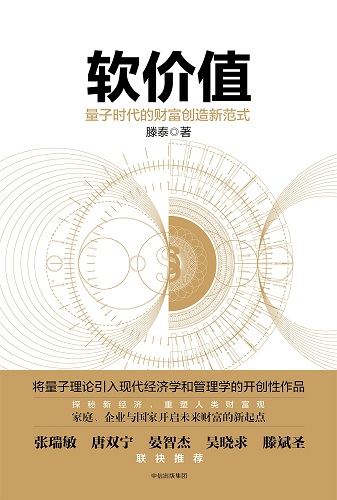New paradigm to create wealth in the ‘quantum age’

Soft Value: New Paradigm to Create Wealth in the Quantum age
Author: Teng Tai
Publisher: CITIC Group
In the future, how will humanity create and pursue wealth?
Land, talent, technology, policies…these are certainly key elements. But after reading Teng Tai’s Soft Value, it became clear that there may be something more important. Wealth creators must discard the “Newton way of thinking” and master the “quantum way of thinking,” which would enable them to study and utilize the laws of “soft value.”
As science and technology is the top productive force, quantum technology is becoming the new research focus for scientific innovation. In 2014, Nature recognized the potential value of quantum timing, imaging, sensing, communications and computing in creating new products and services. With the successful launch of the world’s first quantum science experimental satellite “Mozi,” China is leading the world in the exploration of quantum communications.
However, the cutting-edge technology may at first glance seem to have little to do with ordinary people. The book indicates that in the post-industrial era, the creativity of humanity has become the main source of value creation, and that thinking itself is essentially a quantum movement that creates the soft value of wealth.
In the modern world, the value theories in traditional economics influenced by Newtonian mechanics failed to explain many economic phenomena. These theories can only interpret the hard value of wealth but are insufficient to explain the uncertainty, non-conservativeness, and non-exclusiveness of “soft value.” In contrast to the hard value that is confined to production costs, the pricing of “soft value” is determined by market recognition, attention, value judgments and risk assessments.
Teng is ambitious in introducing “quantum thinking” to the study of economics in order to establish new economic patterns and reshape human wealth. He said that in the past we mainly relied on labor to create wealth, and in the future we will mainly rely on intelligence to create wealth.
However, the labor-intensive business model has so far been followed by many Chinese companies. There are still many businesses whose only sales strategies are to provide discounts, while many others try to pursue wealth by using hard value techniques, such as adding investment, expanding production scale and overwhelming competitors with price wars. However, in the face of “dimensionality reduction attacks” by rivals that have the competitive edge of soft wealth, they might end up as the book predicts: challenging the “exponential jump” of soft value with “arithmetic growth” of hard value will end in crushing defeat.
In contrast, there are many enterprises in the US that emphasize brands, concepts, experience, and a wealth of knowledge, such as various Hollywood studios, Google, McKinsey and Disney. These companies developed rapidly regardless of the financial crisis in the country. Teng is not afraid to point out that when countries with great soft power grasp the tide and dominance of consuming wealth, those firms and laborers who still focus on hard wealth can only work hard to earn meager pay.
(edited by SUI JINGJING)
